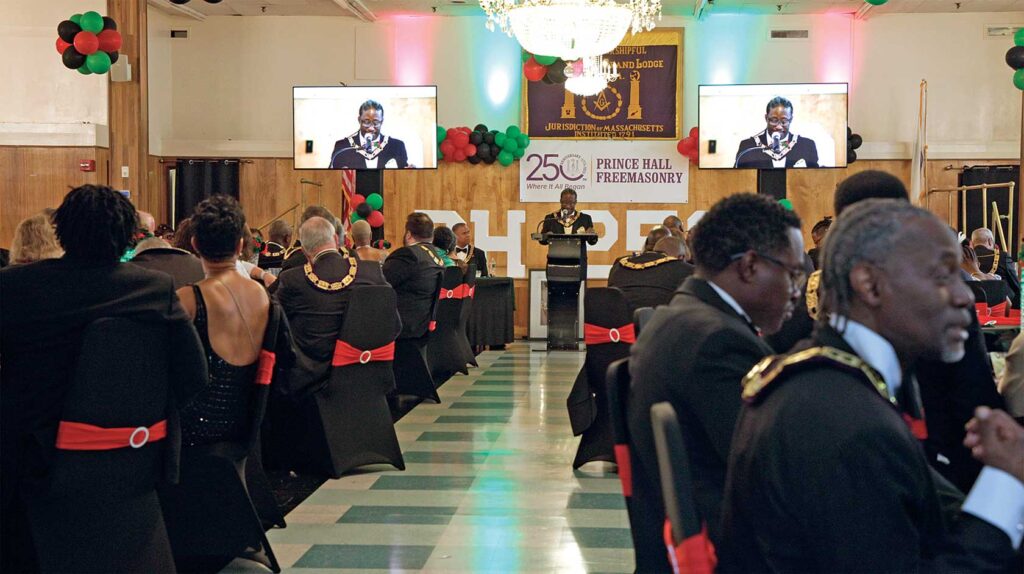
Boston has always been a city where history feels close at hand. The brick sidewalks, the cobblestone alleys, the gold dome of the State House gleaming over Beacon Hill — they whisper of the past in every season. Here, history doesn’t just live on plaques and in museums; it’s under your feet, in the stones that have been walked for centuries.
When my lifelong friend Ron Mitchell, publisher of The Bay State Banner, called and asked me to tell this story, he knew that with my background — years in television journalism, now a screenwriter, author, I’d be the right fit.
The story was about a man who’s name was familiar: Prince Hall. I’d heard it my whole life from family but didn’t know his story. His name sounded royal and majestic, yet I realized I knew little beyond that. There are no known photographs of Hall, but in records and written accounts, he is described as a tall, dark-skinned man. In my mind’s eye, I always pictured him in colonial regalia, perhaps with a white powdered wig — the sign of nobility and societal rank in those days.
The real story was even more compelling. Hall was a free man who owned a leather shop in Boston. There, he met learned men of stature who shared the brotherhood of masonry. Hall wanted in, knowing that such a fraternity could strengthen the abolitionist movement and give him and other Black men the ability to improve the lives of their people. Hall’s passion for education and equality was shared by his wife, Sarah Ritchie Hall, whose resolve would also shape his mission. Sarah was arrested in Boston for the “crime” of teaching young Black girls to read — an act considered dangerous by those who sought to keep African Americans uneducated and subservient. Her defiance underscored for Hall the urgent need for institutions that could protect, empower and uplift their people. Freemasonry, with its emphasis on moral character, education and brotherhood, became for him not just a personal ambition, but a means to advance freedom and dignity for all.
But gaining membership would not prove easy. After appealing to local lodges and being rejected, it was an Irish lodge stationed on Castle Island that finally accepted him. Even then, Hall’s ambitions stretched further. He petitioned England for his own charter and was eventually granted the right to form African Lodge No. 1 — an act that would change history.
And yet, despite his stature and the weight of his accomplishments, Prince Hall is largely absent from the history books. This was a man who lived and worked in the same revolutionary Boston as George Washington, Thomas Jefferson, Benjamin Franklin and other founding fathers. His story unfolded alongside theirs, yet his name is rarely mentioned in the same breath.
Last weekend, Freemasons from across the United States and overseas traveled to Boston to mark the 250th anniversary of the day Prince Hall became a Mason — an act that defied the racial barriers of its time and sparked a movement that now counts more than 300,000 members worldwide.
In the late 1700s, African Americans were unofficially barred from joining white Masonic lodges. Hall’s determination led him to the Grand Lodge of Ireland, whose members initiated him and 14 other Black men on March 6, 1775. To get there, they crossed Boston Harbor in secret at low tide to Castle Island, then a British military installation.
Standing on Castle Island during filming for the documentary, I could almost see it: silhouettes of men moving quietly on foot under a moonlit sky, the salt air thick, the city still under British control. That moment — more than a decade before the Revolutionary War ended — set in motion the founding of African Lodge No. 1.
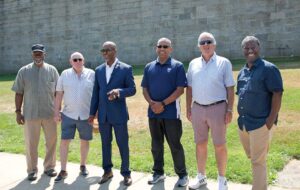
Pictured at Castle Island are, from left, Louis Elisa, unidentified guest from Ireland, Justin Petty, Martin Nearon, M.W. Brother Richard S. G. Ensor, R.W. Brother Dr. Oscar Alleyne, PHOTO: RONALD MITCHELL
Justin Petty, the most recent grand master of the Prince Hall Lodge in Boston, put it in perspective:
“So, in 1775, there was no United States. The colonists were going through a transformative period of time where they were actually fighting to create the United States. When Prince Hall Freemasonry was started on March 6, 1775, Prince Hall Freemasons played a vital and important role in the formation of the United States. They were fighting at the Battle of Lexington, the Battle of Concord — where they talked about the shot heard around the world. They were fighting at the Battle of Bunker Hill. Our first lodge, African Lodge Number One, was formed on July 3, 1776 — one day before the Declaration of Independence. So, we know that the Prince Hall Freemasons, or the Freemasons of African Lodge, were patriots, fighting to help make America what it is today.”
Richard S. G. Ensor the current grand master of Lodge No. 441 in Ireland — the very lodge where Hall was initiated — spoke with a warm, rolling brogue that gave his words the rhythm of a story handed down through generations:
“Prince Hall joined our Irish Masonic Lodge, Number 441, on the 6th of March, 1775, along with 14 other Black men. Incredibly unusual for the time — it’s almost hard to believe. Even today, a lot of people in Ireland don’t know this history. In fact, first time I ever saw a Black person was when I went to London at about 25 years of age. In Ireland at the time, there simply weren’t any. Now we’re multicultural, with people from all over the world. The lesson from Prince Hall’s story is inclusivity — everybody is equal. We’re all on this earth, we breathe the same air, and we should have the same chances no matter our color or creed. I’d say there were probably eyebrows raised back in the 1700s, but they made the decision to admit him, and that was marvelous.”
On Castle Island, in front of the old fort, Petty and Ensor embraced in brotherhood. Their exchange was powerful and telling.
Ensor: “Quite incredible. He must have been one hell of a man and one hell of a Mason, and it’s marvelous to be here representing the Grand Lodge of Ireland. We’ve played a small part, I would think.”
Petty: “No — that was a big part. In Prince Hall Freemasonry, it’s recognized as a big part.”
Ensor: “You’re very kind to say so. Because if you know the struggle that Prince Hall had in even becoming a Mason — that wasn’t his first attempt. He asked many other Freemasons in Boston, and he was turned down. He was rejected. It was only after he found the Irish Lodge and expressed his interest that the Irish Lodge picked that up.”
Prince Hall’s vision was never just about membership — it was about building an institution that would uplift and serve the community. Today, Prince Hall Masons continue that work, raising millions annually for scholarships, disaster relief, community programs and youth mentorship. Across their lodges, members volunteer in food banks, sponsor local sports teams and organize neighborhood cleanups.
The culminated in a black-tie banquet at the Prince Hall Lodge in Roxbury. Members arrived in their finest evening wear, many adorned with traditional Masonic regalia — intricately embroidered aprons, jewel-encrusted collars and medallions denoting their rank in the order. The room shimmered with gold braid, deep blues and crisp whites, each piece of regalia a visual link to centuries of tradition. The air carried the warmth of camaraderie and the pride of legacy, as brothers from across the country and from around the world shared the same table in the very city where it all began.
Walking through Boston that night — past the State House dome, along Tremont Street, down the cobblestones of Union Street — I kept returning to the same thought: Prince Hall’s life had all the elements of great struggle, vision, defiance and triumph. The fact that this true American “Founding Father” story remains largely absent from our history books is reason enough to believe the time to tell his story is long overdue. Last weekend’s celebration reminds all of us why telling his story still matters.

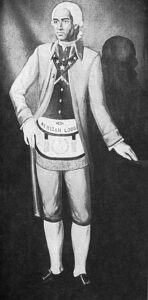


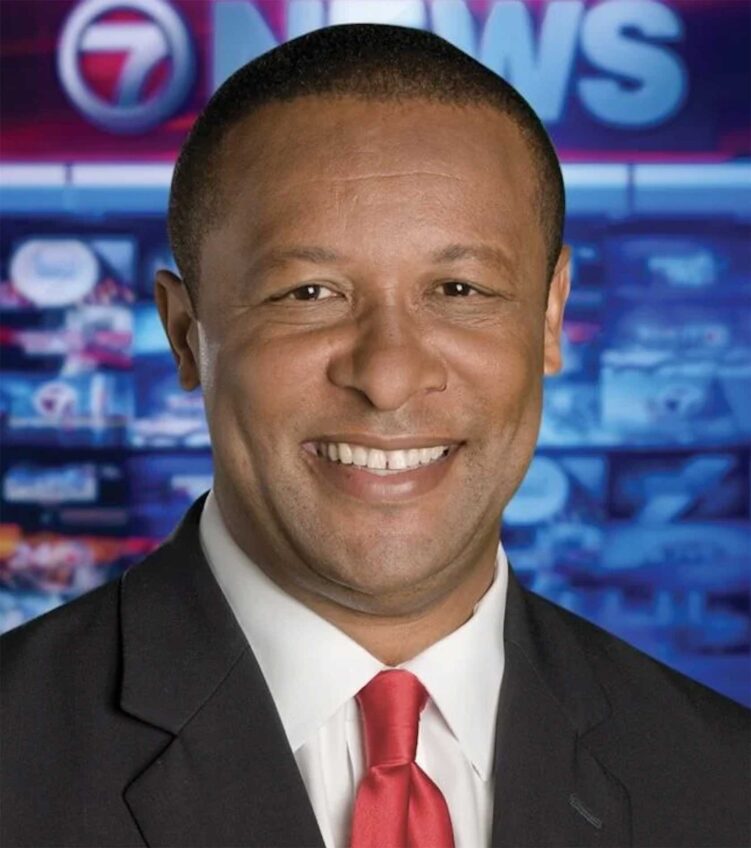
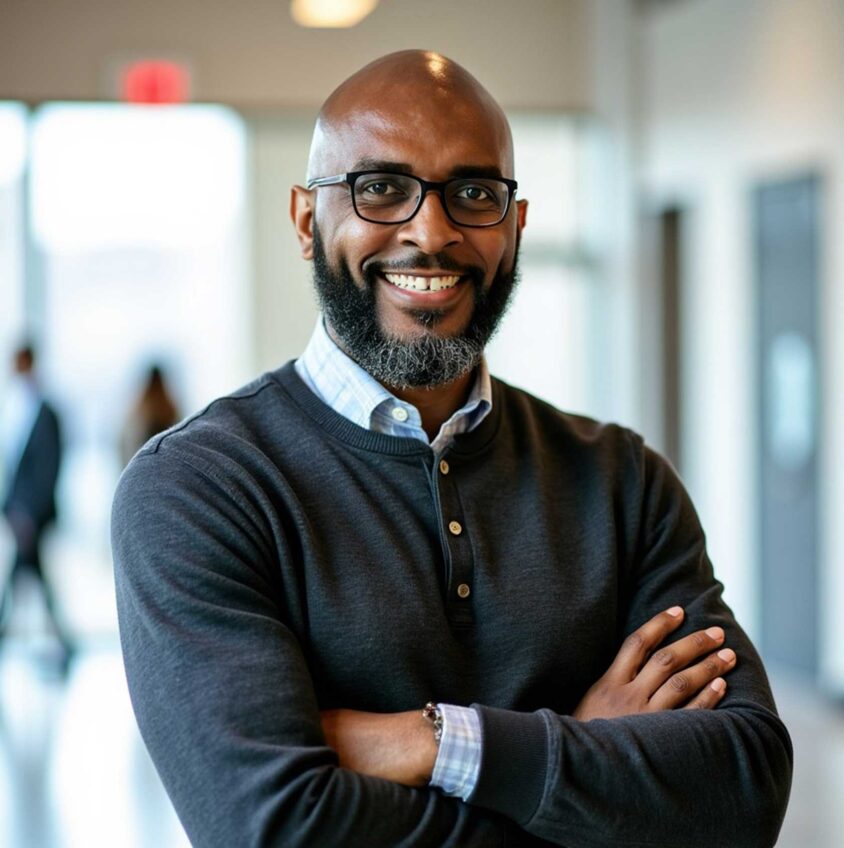
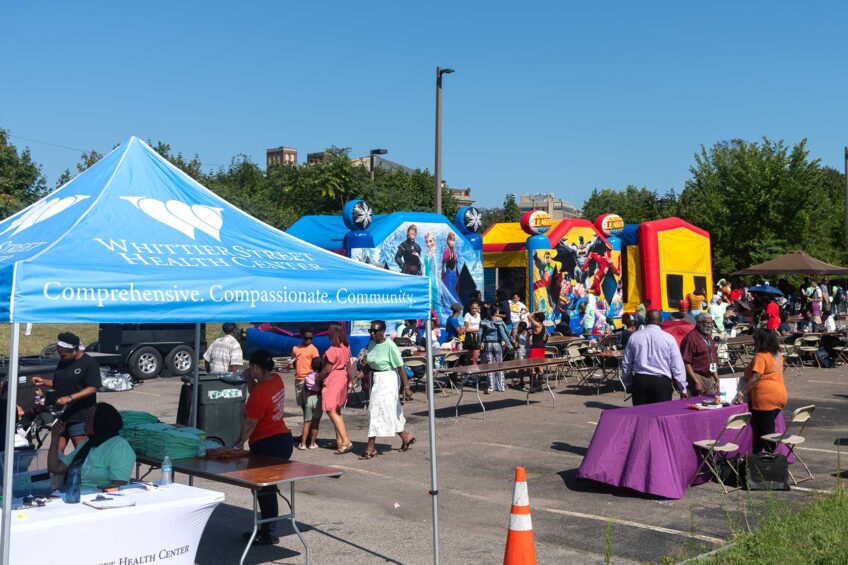
Leave a Reply
You must be logged in to post a comment.